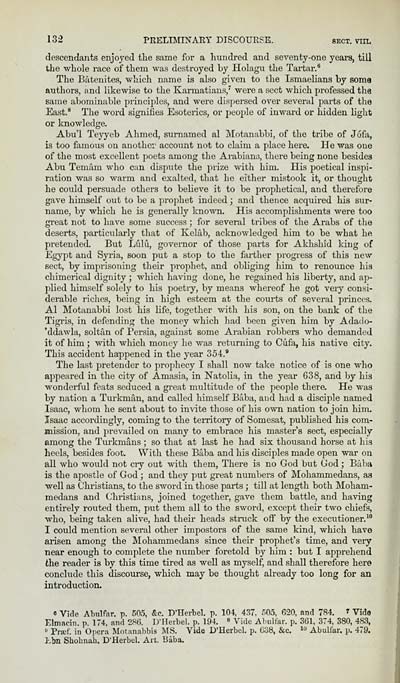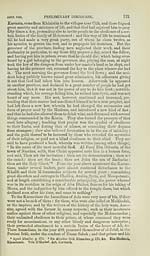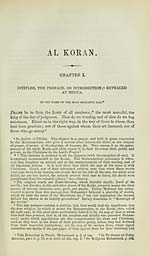Download files
Complete book:
Individual page:
Thumbnail gallery: Grid view | List view

132 PRELIMINARY DISCOURSE. sect. vin.
descendants enjoyed the same for a hundred and seventy-one years, till
the whole race of them was destroyed by Hohxgu the Tartar.*
The Batenites, which name is also given to the Ismaelians by some
authors, and likewise to the KaiTaatiaus/ were a sect which professed tli8
same abominable principles, and were dispersed over several parts of the
East.* The word signifies Esoterics, or people of inward or hidden light
or knowledge.
Abu'l Teyyeb Ahmed, surnamed al Motanabbi, of the tribe of Jofa,
is too fiimous on another account not to claim a place here. He was one
of the most excellent poets among the Arabians, there being none besides
Abu Temam who can dispute the i:)rize with him. His poetical inspi-
ration was so warm and exalted, that he either mistook it, or thought
he could persuade others to believe it to be prophetical, and therefore
gave himself out to be a prophet indeed ; and thence acquired his sur-
name, by which he is generally kno-mi. His accomplishments were too
great not to have some success ; for several tribes of the Arabs of the
deserts, particularly that of Kelab, acknowledged him to be what he
pretended. But Lulu, governor of those parts for Akhshid king of
Egypt and Syiia, soon put a stop to the farther i)rogress of this new
sect, by imprisoning their prophet, and obliging him to renounce his
chimerical dignity ; which having done, he regained his liberty, and ap-
plied himself solely to his poetry, by means whereof he got veiy consi-
derable riches, being in high esteem at the courts of several princes.
Al Motanabbi lost his life, together with his son, on the bank of the
Tigris, in defending the money which had been given him by Adailo-
'ddawla, soltan of Persia, against some Arabian robbers who demanded
it of him ; with which money he was returning to Cufa, his native city.
This accident happened in the year 354."
The last pretender to prophecy I shall now take notice of is one who
appeared in the city of Amasia, in Natolia, in the year G38, and by his
wonderful feats seduced a gi-eat multitude of the people there. He was
by nation a Turkman, and called himself Baba, and had a disciple named
Isaac, whom he sent about to invite those of his own nation to join him.
Isaac accordingly, coming to the territory of Somesat, published his com-
mission, and prevailed on many to embrace his master's sect, especially
among the Turkmans ; so that at last he had six thousand horse at his
heels, besides foot. With these Baba and his discijoles made open war on
all who would not ciy out with them. There is no God but God ; Baba
is the apostle of God ; and they put gi-eat numbers of Mohammedans, as
well as Christians, to the sword in those parts ; till at length both Moham-
medans and Christians, joined together, gave them battle, and having
entirely routed them, put them all to the sword, except their two chiefs,
who, being taken alive, had their heads struck off by the executioner.'"
I could mention several other impostors of the same kind, which havo
arisen among the Mohammedans since their prophet's time, and veiy
near enough to com]ilete the number foretold by him : but I apprehend
the reader is by this time tired as well as myself, and shall therefore here
conclude this discourse, which may be thought already too long for an
introduction.
« Vide Abulfar. p. 505, &c. D'Herbel. p. 104, 437, 503, 620, and 784. ? Vide
Elmacin. p. 174, and 286. D'Herbel. p. 194. s Vide Abulfar. p. 361, 374, 380, 483,
^ Prffif. in Opera Motanabbis MS. Vide D'Herbel. p. 638, &c. ^o Abulfar. p. 479.
hbn Shohnah. D'Herbel. Art. Baba.
descendants enjoyed the same for a hundred and seventy-one years, till
the whole race of them was destroyed by Hohxgu the Tartar.*
The Batenites, which name is also given to the Ismaelians by some
authors, and likewise to the KaiTaatiaus/ were a sect which professed tli8
same abominable principles, and were dispersed over several parts of the
East.* The word signifies Esoterics, or people of inward or hidden light
or knowledge.
Abu'l Teyyeb Ahmed, surnamed al Motanabbi, of the tribe of Jofa,
is too fiimous on another account not to claim a place here. He was one
of the most excellent poets among the Arabians, there being none besides
Abu Temam who can dispute the i:)rize with him. His poetical inspi-
ration was so warm and exalted, that he either mistook it, or thought
he could persuade others to believe it to be prophetical, and therefore
gave himself out to be a prophet indeed ; and thence acquired his sur-
name, by which he is generally kno-mi. His accomplishments were too
great not to have some success ; for several tribes of the Arabs of the
deserts, particularly that of Kelab, acknowledged him to be what he
pretended. But Lulu, governor of those parts for Akhshid king of
Egypt and Syiia, soon put a stop to the farther i)rogress of this new
sect, by imprisoning their prophet, and obliging him to renounce his
chimerical dignity ; which having done, he regained his liberty, and ap-
plied himself solely to his poetry, by means whereof he got veiy consi-
derable riches, being in high esteem at the courts of several princes.
Al Motanabbi lost his life, together with his son, on the bank of the
Tigris, in defending the money which had been given him by Adailo-
'ddawla, soltan of Persia, against some Arabian robbers who demanded
it of him ; with which money he was returning to Cufa, his native city.
This accident happened in the year 354."
The last pretender to prophecy I shall now take notice of is one who
appeared in the city of Amasia, in Natolia, in the year G38, and by his
wonderful feats seduced a gi-eat multitude of the people there. He was
by nation a Turkman, and called himself Baba, and had a disciple named
Isaac, whom he sent about to invite those of his own nation to join him.
Isaac accordingly, coming to the territory of Somesat, published his com-
mission, and prevailed on many to embrace his master's sect, especially
among the Turkmans ; so that at last he had six thousand horse at his
heels, besides foot. With these Baba and his discijoles made open war on
all who would not ciy out with them. There is no God but God ; Baba
is the apostle of God ; and they put gi-eat numbers of Mohammedans, as
well as Christians, to the sword in those parts ; till at length both Moham-
medans and Christians, joined together, gave them battle, and having
entirely routed them, put them all to the sword, except their two chiefs,
who, being taken alive, had their heads struck off by the executioner.'"
I could mention several other impostors of the same kind, which havo
arisen among the Mohammedans since their prophet's time, and veiy
near enough to com]ilete the number foretold by him : but I apprehend
the reader is by this time tired as well as myself, and shall therefore here
conclude this discourse, which may be thought already too long for an
introduction.
« Vide Abulfar. p. 505, &c. D'Herbel. p. 104, 437, 503, 620, and 784. ? Vide
Elmacin. p. 174, and 286. D'Herbel. p. 194. s Vide Abulfar. p. 361, 374, 380, 483,
^ Prffif. in Opera Motanabbis MS. Vide D'Herbel. p. 638, &c. ^o Abulfar. p. 479.
hbn Shohnah. D'Herbel. Art. Baba.
Set display mode to: Large image | Transcription
Images and transcriptions on this page, including medium image downloads, may be used under the Creative Commons Attribution 4.0 International Licence unless otherwise stated. ![]()
| Early Gaelic Book Collections > J. F. Campbell Collection > Koran: or, Alcoran of Mohammed > (154) |
|---|
| Permanent URL | https://digital.nls.uk/77135789 |
|---|
| Description | Volumes from a collection of 610 books rich in Highland folklore, Ossianic literature and other Celtic subjects. Many of the books annotated by John Francis Campbell of Islay, who assembled the collection. |
|---|
| Description | Selected items from five 'Special and Named Printed Collections'. Includes books in Gaelic and other Celtic languages, works about the Gaels, their languages, literature, culture and history. |
|---|

